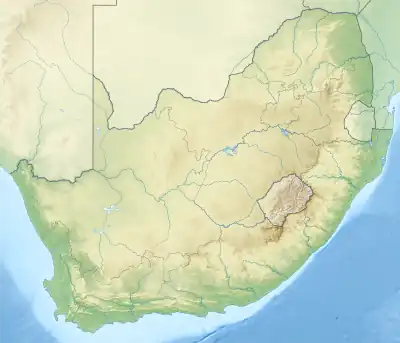| Nzhelele River | |
|---|---|
 View of the Nzhelele River in the Philip Herd Nature Reserve | |
 Location of the Nzhelele River mouth | |
| Etymology | Nzhelele meaning a falcon or an eagle that in ancient times followed elephant hunters and fed on the meat hanging in the trees to dry.[1] |
| Location | |
| Country | South Africa |
| State | Limpopo Province |
| Region | Dzanani |
| District | Vhembe |
| Municipality | Makhado |
| Physical characteristics | |
| Source | Thathe Vondo |
| • location | Soutpansberg |
| • elevation | 1,673 m (5,489 ft) |
| Mouth | |
• location | Limpopo River, South Africa/Zimbabwe border |
• coordinates | 22°21′08″S 30°22′19″E / 22.35222°S 30.37194°E |
• elevation | 404 m (1,325 ft) |
| Basin size | 3,436 km2 (1,327 sq mi) |
| Basin features | |
| Tributaries | |
| • left | Mutamba |
| • right | Mufungudi, Tshishiru |
The Nzhelele River is a major watercourse in Limpopo Province, South Africa. The river's catchment area comprises 3,436 square kilometers.[2]
Course
This river collects much of the drainage of the northern slopes of the extensive rock formation of the Soutpansberg. Leaving the mountainous area, it meanders in a northeastward direction across the Lowveld, a wide plain that contains considerable biodiversity, including numerous large mammals such as giraffes, white rhinos and blue wildebeests.[3] It joins the right bank of the Limpopo River 33 km east of Musina.[4]
The Mutamba River, its main tributary, rises in the Buelgum Poort farm of the Soutpansberg, further west from the sources of the Nzhelele.[5] Other tributaries are the Tshiruru River, Mugungudi River, Mutshedzi River and the Wyllie River.[6]
Dams in the basin
- Nzhelele Dam
- Mutshedzi Dam, in the Mutshedzi River
See also
References
- ↑ Transvaal Indigenous Place Names Archived 2008-10-31 at the Wayback Machine
- ↑ Major rivers and streams within the Limpopo River Basin
- ↑ Sites - Important Bird Areas (IBAs) - Soutpansberg
- ↑ "Nzhelele Sub-basin". Archived from the original on 2012-04-20. Retrieved 2012-03-24.
- ↑ Soutpansberg - Geology and Geography
- ↑ Busari, Ola (2008). "Groundwater in the Limpopo Basin: Occurrence, use and impact". Environment, Development and Sustainability. 10 (6): 943–957. doi:10.1007/s10668-007-9094-3. S2CID 154503353.
External links
 Media related to Nzhelele River at Wikimedia Commons
Media related to Nzhelele River at Wikimedia Commons- Sites - Important Bird Areas (IBAs) - Soutpansberg
- Limpopo WMA1
- Aventura Tshipise Resort & Restaurant